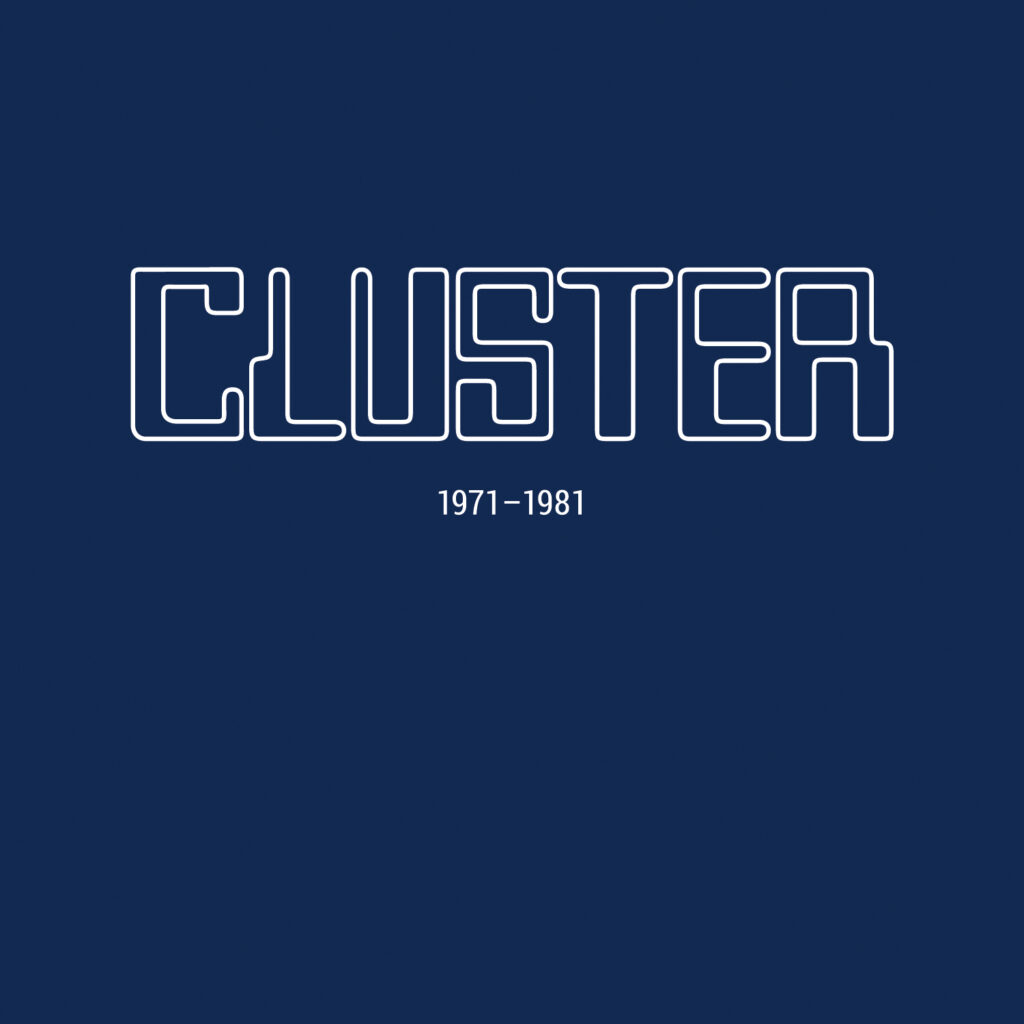We are living in Cluster’s world now. Some short while ago I found myself in a basement bar, surrounded by movers and takers, while an earnest fellow wrestled with vintage circuitry for our evening’s entertainment. He conjured pops and scrapes which coalesced and rubbed up against each other in cellular proliferation, giddy with excitement at their combustible gathering, before bursting in gleeful splatters into the greasily smeared drone which formed the backdrop for this musical piece. It was really quite lovely and a scene of which I have witnessed countless variations throughout the years. Somewhere on Earth just now, other people will be making similar noises to small gatherings willing to untether themselves and just drift through a spatially and emotionally encompassing narrative of sound. There isn’t really a genre title for it; electronica doesn’t do it, or anything else much, justice. But it’s music which wouldn’t exist without Cluster.
The eight original albums (plus one new archival live album) gathered here share an evolutionary pattern throughout the 1970s similar to Bowie, Roxy Music, Can and, inevitably, Eno. The earliest recordings are focused on raw, unfiltered noise forms which make no attempt to communicate on any pre-conceived wavelengths or lay search for notional audiences. They are instead spat out into existence as if daring would be listeners to interpret and understand their violent breach of space and time. Yet, nearly ten years pass and Steinway pianos plaintively tinkle in lush pastures while hollow and disconsolate melancholy beckons ahead.
Nothing quite prepares you for your first listen to Cluster 71. While the professional pairing of Hans Joachim-Roedelius and Dieter Moebius had previous form as Kluster alongside Konrad Schnitzler, this rebirth feels even more unsignalled and malcontent than the two albums they released as that trio. It begins with what sounds like a train approaching down far distant tracks which gradually and deliberately whips into an annihilating frenzy ripping into corporeal dimensions like a malignant presence hell bent on manifestation, free of context or meaning. Cluster 71‘s three pieces, titled only by their running times, play as furious invocation and repudiation of the time and place from which they fell. If Cluster had never done anything again, this record would still stand as one of the grand works of 1970s’ Kosmische music. It’s hard to imagine its dark purge, oozing and sticky, ever-dating.
Yet Cluster went on to release a stream of records which collectively opened up diverging avenues for future tacticians. 1972’s Cluster II begins to apply shards of structure and vague harmonic principles in amongst the grinding tape loops which would influence an entire pre and post-punk generation of brutalist noise-makers in pursuit of filleting song formations as if disembowelling cuckoo clocks. Two years later, Zuckerzeit brings forth sparkling melodies which pop like champagne corks at bucolic lawn parties and must surely have been a template for so many of Warp’s early roster of artists. Then comes 1976’s Sowiesoso, an electronic suite to pastoral living from gentlemen artists now ensconced deep in the German countryside which remains unparalleled in its depiction of another blissful green world. Synthetic birds chirrup, bells chime and life is easy and good. The title track feels like driving down into a sun-dappled verdant valley at dawn.
Sowiesoso, and the Harmonia project, paved the way for Cluster’s two albums with Brian Eno. 1977’s Cluster & Eno could be the most relaxed and least uptight album Eno has yet been involved with, a perfectly phrased collection of glistening miniatures making up the missing link between Before And After Science and Music For Films, even letting loose with a mild-mannered cosmic jam on ‘One’. The following year’s After The Heat, credited to Eno Moebius Roedelius, feels more like Eno in charge with Cluster as backing band. The miniatures have become fully realised songs and, while it stands apart from Cluster’s other work, it remains a classic 1970s’ Eno album which points ahead to the ambient roam and nervous twitch funk of Bowie’s Lodger and Eno’s work with Talking Heads.
The final two contemporary records here, 1979’s Grosses Wasser and 1981’s Curiosum, play as consolidations and final resolutions before Cluster’s first temporary parting. Both albums feel conspicuously stripped down, the predominate use of acoustic grand piano on Grosses Wasser lending the feel of modern-day chamber music which would become a mainstay of Roedelius’s solo work while Curiosum focuses on blunt shapes of sound which crunch and stumble around themselves, building blocks of songs almost despite themselves. Final piece ‘Ufer’ is a barely-there ember of flickering sound, a quiet sift through fading radio static as the machinery crumbles into ash. The environment by this point was evolving within itself, by itself, growing like living islands within the landscape. Cluster had rewritten the linguistics of modern sound and then turned away without any further heed. Somewhere, someone would always be playing live in der Fabrik from here on.


